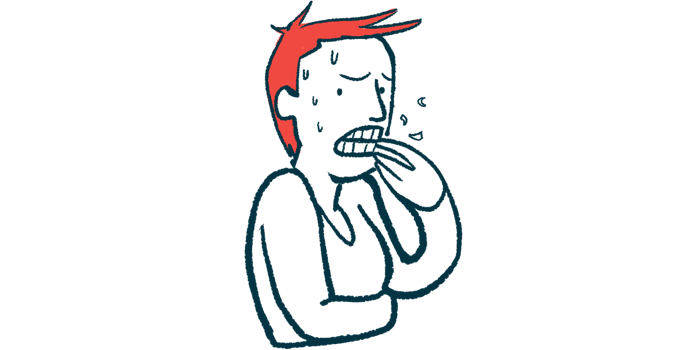Childhood trauma affects adult children in Huntington’s families
New study finds increased psychological distress during adulthood

Children of people with Huntington’s disease are subject to more childhood trauma than their peers, contributing to increased psychological distress during adulthood, a new study reports.
The researchers noted that while the symptoms of Huntington’s can manifest at any time of life, “their onset is usually around [the] age of 40-50 — a … time when most … people have caring responsibilities for families and children.” Given that such symptoms “may include anxiety, low mood, compulsive behaviors, … and impaired emotion processing,” families of Huntington’s patients “often face a significant burden,” the team wrote.
This study sought to investigate the impact this might have on youngsters in families affected by Huntington’s once the children reached adulthood.
“Although exploratory, our findings suggest that renewed attention should be given to the potential adverse childhood experiences, particularly emotional abuse, as well as physical abuse and emotional and physical neglect, as these have been shown to occur more frequently within [Huntington’s] families,” the researchers wrote.
Elements of childhood trauma correlated significantly with adult psychological health in this population, with emotional abuse during childhood as the best predictor of psychological distress in adulthood, according to the researchers.
Their study, “Childhood trauma and psychological distress during adulthood in children from Huntington’s disease families: An exploratory retrospective analysis,” was published in the Journal of Huntington’s Disease.
A progressive neurodegenerative disorder, Huntington’s is caused by mutations in the HTT gene, with effects seen in movement, cognition, and mental stability. Symptoms usually include uncontrolled movements and difficulty walking, speaking, and swallowing. Cognitive impairment and changes in emotion and behavior are also common.
The typical onset of symptoms in midlife may disrupt family dynamics, with children sometimes taking on caregiving roles and facing an added emotional burden. Moreover, about half of people with a parent who has Huntington’s will develop the disease themselves, which could also impact mental health and childhood experience, the researchers noted.
Childhood trauma greater for adults from Huntington’s families vs. controls
Now, a team of investigators in Italy aimed to assess whether and to what extent these Huntington’s-related burdens manifested in childhood trauma and translated to psychological health during adulthood.
Their study involved 38 people, ages 18 and older, who had been raised within a Huntington’s family. A group of 20 adults whose parents didn’t have neurodegenerative or psychiatric conditions during their childhood was also included as controls.
People in the Huntington’s family group had a mean age of 28.7 at the time of participation. They were an average of 9.6 years when their parents began experiencing symptoms. Of the 27 adults with genetic data available, 15 were positive for a Huntington’s-causing mutation. The control group, meanwhile, had a mean age of 30.4.
All participants completed the Childhood Trauma Questionnaire-Short, or CTQ-SF, to assess childhood trauma, as well as the Symptom Checklist-90 Revised questionnaire to evaluate adult psychological distress. Each questionnaire yielded a score, with higher scores indicating more trauma or distress.
The results showed that participants from Huntington’s families scored significantly higher on both questionnaires, and on several of their categories, indicating worse childhood trauma and psychological distress.
Regarding childhood trauma, the children of Huntington’s parents scored significantly higher on CTQ-SF subscales of abuse and neglect, both physical and emotional. Scores on sexual abuse, the remainder subscale, were similar between the two groups.
“This finding appears consistent with previous quantitative and qualitative investigations showing that being raised in an HD [Huntington’s disease] family is linked to considerable challenges, including adverse childhood experiences, insecure attachment, intrafamilial conflicts, lack of communication, reduced general resilience, and increased risk of emotional and physical harm,” the team wrote.
Researchers call for targeted interventions to support Huntington’s families
For adult distress, participants from Huntington’s families scored higher in all nine categories relative to the controls, but these differences only reached statistical significance for depressive and psychotic symptoms.
Neither childhood trauma nor adult distress was significantly different between groups with positive, negative, or unknown Huntington’s-mutation status, the data showed.
In the Huntington’s family group, greater childhood trauma, as well as higher scores on each of the CTQ-SF subscales, were significantly associated with worse adult distress. There also was a significant association between a parent’s younger age at symptom onset and greater childhood trauma.
“The sooner participants were exposed to their parents’ condition, the higher their self-reported childhood traumatic experiences,” the researchers wrote.
A statistical model demonstrated that childhood trauma explained 50.1% of variance in adult psychological distress, “highlighting its significant role in shaping long-term mental health outcomes, while indicating that other factors also contribute to the complex and multifactorial nature of psychological difficulties in individuals from HD families,” the team wrote.
Further statistical analyses showed that, among the CTQ-SF subscales, only emotional abuse was a significant predictor of global psychological distress in adulthood.
Additional studies are warranted to corroborate and expand on the present results by addressing further potential psychological factors as well as to develop targeted interventions to support families affected by the disease and promote long-term mental well-being.
The researchers suggested that organizations for young people in Huntington’s families could build community to help support children whose parents have the disease, and to mitigate traumas.
“Additional studies are warranted to corroborate and expand on the present results by addressing further potential psychological factors as well as to develop targeted interventions to support families affected by the disease and promote long-term mental well-being,” the team wrote.
Among the study’s limitations, as noted by the researchers, was that the childhood results may have been affected by biases in participants’ memories.
Larger studies, following children over time, are needed to confirm these findings and better understand the link between childhood trauma within a Huntington’s family and future adult distress, the researchers concluded.








